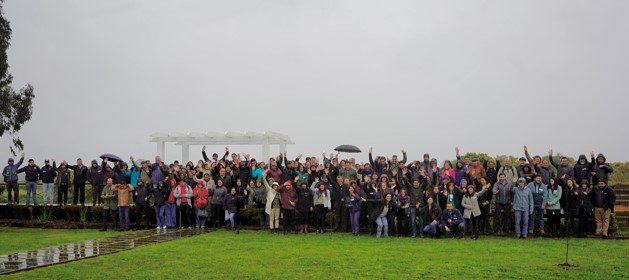
The initiative seeks to develop a proposal that projects the productive sector towards 2050, including the views of all interest groups that are part of the value chain in the southern south of the country.
Develop the bases of the activity for the coming decades, including the views of all those who are part of salmon farming. That was the objective that SalmonChile set for itself when planning its project “Dialogues for future salmon farming”, which – starting last June – brought together people from 37 communes in the southern south of the country to listen and find out what the opportunities are, challenges and gaps that must be worked on to enhance the productive sector.
The last of these meetings was held this Thursday in Puerto Montt, where more than 200 people from the entire Los Lagos Region arrived, including regional authorities, as well as leaders of production and supplier companies, worker representatives, of indigenous communities, students, and the community in general. Together, they addressed issues about sustainability, economic development and social well-being, coexistence at sea and territories, among others.
In this way, in the last four months more than 800 people were part of this initiative in the regions of Biobío, La Araucanía, Los Ríos, Magallanes, Aysén and Los Lagos.
The Director of Communities of SalmonChile, Felipe Díaz, highlighted that “we are doing these dialogues to think about our productive sector towards 2050. But not only as salmon farmers, but including the vision of the authorities, indigenous communities, neighbors, suppliers, companies and workers. . We believe that it is essential to have diverse opinions and visions that aim to further improve our work, which is why we are proud of what was generated throughout the southern region as a result of this initiative. It is unprecedented that an industry calls to define its lines of action, together with those who are linked in the territories, laying the foundation for collaborative work thinking about contributing to the development of the southern south of the country.”
It should be noted that within the more than 160 work tables and 45 hours of conversation that took place in the “Dialogues for the salmon farming of the future”, there was the participation of government, regional and local authorities, which were part of these conversations and presented the points that they believe are key for the productive sector, and collected the proposals that society and companies pointed out to advance collaborative work.
“It is very important that the actors in a productive sector so relevant to the development of the country, but particularly for our southern regions, give themselves the openness that this deserves to talk about the challenges that the salmon industry has in particular,” indicated the Seremi of Economy of the Los Lagos region, Luis Cárdenas.
For his part, the president of the Merluceros union association of the Los Lagos region, Juan García, indicated that “the salmon industry generates a lot of employment and is a fundamental pillar in the growth of the region. But I also think that this dialogue is still missing, to be able to put them on the table to be able to continue moving forward and reach the year 2050 with a fully established industry that dialogues much more with artisanal fishing and with all the actors on the coastline of our area.” .
Likewise, the president of the Salmones Austral Inter-Company Union, secretary of Fetrasalmón and spokesperson for the Coordinator of Salmon Industry Workers, Elizabeth Pulgar, commented that “it is something that as leaders we have been working on since 2016 with the industry. We had put this point on the table, to dialogue with all the communities that are related to the salmon industry. It is a dream to see that this has finally become a reality and that today people who are outside, who do not know the industry, have been able to get to know it through these dialogues. So for us as leaders, this moment that we are experiencing and that today is the closure is super important.”
SalmonChile’s Corporate Affairs Manager, José Tomás Monge, said he was “very happy. I think this is like the icing on the cake: The very diverse call from the world of artisanal fishing, from the union world, from companies, from NGOs, from unions. So, very happy for the support of this initiative.”
“I am also very happy for the support of our own companies, for believing in this project, which was so important to know, to double-click on the regional realities, which are so different. Biobío is very different from Magallanes; Magallanes is very different from Aysén. Last week we were lucky to have the dialogues and meet with the director of SalmonChile there,” he continued.
“So I think it is a veneer of reality, a veneer also of what the gaps, challenges are and how we project ourselves as an activity to 2050. So, that is why we highly value being able to talk about sustainability, local development, coexistence. in the sea and territory, thinking about how we project a closer industry, more valued by the environment,” he added.
Furthermore, Francisca López, head of Communities at Blumar, expressed that “the truth is that it is super enriching for the dialogue, that all parties feel involved in the formation of this great document that SalmonChile will generate, because finally, getting together Talking about the good and the beautiful and the beautiful things we do is spectacular, but it is also important to receive criticism, know the challenges, understand the problems of the protagonists of these dynamics.”
Finally, the person in charge of Sustainable Projects at Multi It seemed to me to be an instance where all the actors in society have been able to talk about the key issues for the future and it has happened that many issues are repeated such as social issues, education, the economy and how we want to advance in the south towards the future”.
Source: www.aqua.cl

